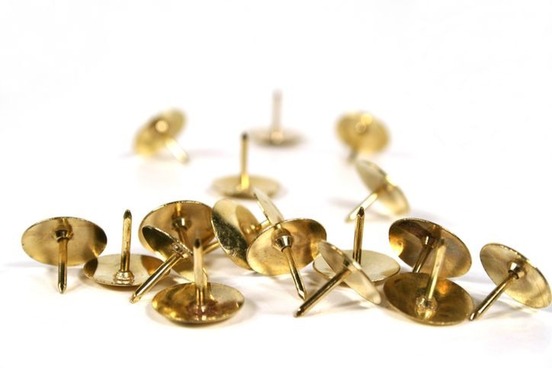
Lead foot
Despite its reputation, lead is not the heaviest of the naturally occurring metals. That honor belongs to osmium (if you’re going by density) or plutonium (if you’re going by its atomic mass). But lead, traditionally used in weighted objects such as plumb lines (the Latin plumbum means “lead,” after all) has historically been the go-to element when you want to describe something as immoderately heavy.
She was all alone in her misery, and could see no way out of it. The diamonds were heavy as a load of lead within her bosom. And yet she had persevered.
— Anthony Trollope, The Eustace Diamonds, 1871
In the 16th century, the adjective leaden-footed described one who moved slowly. But when you give such a foot to a person operating a vehicle with an accelerator pedal, the image becomes one of a motorist driving at high speeds.
If you’ve been known to have a lead foot, you might want to watch out. Drivers in Lexington will soon see several city roads transition from having a 35 mph speed to a 25 mph limit.
— WKYT.com, 5 Dec. 2018

Gold standard
The term gold standard refers to a system that uses a supply of gold as the backing for a currency to regulate its value. The United States stopped using the gold standard during the Great Depression, but the phrase still gets used for a successful thing against which others are judged.
One seemingly obvious answer is positive train control. The federally mandated safety system, which relies on radio and satellite-based technology to control speeds and prevent crashes and derailments, is considered the gold standard for safety on the nation’s railways
— John Aguilar, The Denver Post, 14 Feb. 2019
Gold’s status as an element of value was propelled chiefly by its luster and scarcity, and gold is often reserved for top-ranking achievements (such as gold medals awarded to victorious athletes in the Olympics) or objects of desire, such as the Golden Fleece.

Tin ear
Tin is a malleable silver-white element used in a number of alloys, including bronze and pewter.
The phrase tin ear has come to be equated with deafness—whether demonstrated in a lack of appreciation for the subtleties of tone (as in music) or obtuseness to the nuances of what someone is saying.
Yet, while reviewers argue theme and technique in great detail, when it comes to humor they seem to have a collective tin ear. If humor is noticed at all, it is often dismissed as simply slick or clever.
— David Kirby, The New York Times Book Review, 23 Dec. 1990
The choice of tin likely has nothing to do with the properties of tin. (It’s a good conductor, which would seem to help in the delivery of electrical signals.) Some have ascribed the phrase to the onetime use of metal ear trumpets by the hard of hearing; others connect tin to tinnitus, the medical term for ringing in the ears.
The term cauliflower ear once was used with the same meaning as tin ear, but the former now more often means an ear that is bruised and swollen (as from receiving a boxer's punch).

Iron fist
To rule with an iron fist (or hand) is to preside over a country or group in a very strict and often cruel way.
Iron is one of Earth's most abundant metals, and consequently among the most frequently used. In its pure form it is also silver-white and relatively soft and malleable.
The association of iron with mercilessness likely comes from the metal’s use to make sturdy alloys such as steel and cast iron (as used in cooking skillets). British Prime Minister Margaret Thatcher was given the nickname “The Iron Lady” due to her reputation for being fierce and unyielding.

Silver screen
Silver is often mentioned alongside gold for its luster and value, and hence appears in a number of expressions pertaining to opulence. But while silver screen does evoke the glitz and glamour of Hollywood stardom, the term did in fact refer to a kind of projection screen used in the early years of the industry. The surface of the screen was embedded with silver (more often aluminum) to enhance its reflective capacity. By the 1920s, silver screen had become an alliterative metonym for the movie business.
Use your intelligence, Jeeves. Reflect what proposing means. It means that a decent, self-respecting chap has got to listen to himself saying things which, if spoken on the silver screen, would cause him to dash to the box-office and demand his money back.
— P. G. Wodehouse, Right Ho, Jeeves, 1934

Platinum blonde
Platinum is a silver-white precious metal often bought as an investment, just like gold and silver, and while platinum is scarcer, its price tends to fluctuate due to supply and demand. The recording industry values platinum over gold in its sales rankings: an album achieves gold-record status when it sells 500,000 copies, while one that sells a million copies is certified platinum.
The term platinum blonde uses the metal's color as a comparison for the color of hair that has been bleached. One of the first actresses labelled with the term was Jean Harlow, who starred as the title character in the 1931 film Platinum Blonde, directed by Frank Capra. While the color can be achieved through treatments such as hydrogen peroxide, Harlow’s stylist purportedly used actual chlorine bleach on the actress’s head, which some have speculated led to health problems for Harlow, who died at age 26.

Brass tacks
Brass tacks are details of immediate practical importance. The term is often found in the phrase get down to brass tacks.
"Oh, I know what you're wondering!" he flared out. "Would I a-spit on it in the pinch? That's what's eating you. I'll answer. Straight out, brass tacks, I WOULD. Put that in your pipe and smoke it."
— Jack London, “Whose Business Is To Live,” 1922
Brass is an alloy of copper and zinc, used in plumbing fixtures, musical instruments, and fastening items (such as pins, bolts, and screws). Brass also carries the association of boldness; to be brazen is to be bold and self-assured to the point of disrespect, but brazen can also mean “made of brass.”
Although no one knows for certain, some have attributed get down to brass tacks to the brass-headed fasteners used to secure upholstery to the framework of furniture. A craftsperson needing to pull out the tacks to remove the upholstery might be equated with the act of getting to the heart of the matter. But that is only one of many theories circulated about the phrase.





